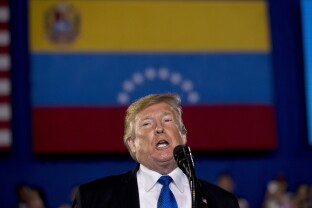In the span of a few weeks, Donald Trump called Venezuela an “enemy” and Nicolás Maduro a violent dictator, railed against Venezuelan migrants fleeing to the United States and floated the idea of seeking refuge in Venezuela himself if he loses the 2024 election.
Trump’s former national security adviser, John Bolton, says this oscillation is par for the course with the former president, recounting a little-explored episode of shadow diplomacy during Trump’s first term, when the former president’s personal associates undermined what should have been a consistently hard stance against the Venezuelan autocrat.
In 2018, Trump told Bolton to “get it done” and push Maduro out. Months later, the Trump administration also supported a democratic resistance in Venezuela. But behind the scenes, as The Washington Post first reported, Trump’s personal lawyer Rudy Giuliani and ex-con businessman Lev Parnas hooked up with Congressman Pete Sessions and oil billionaire Harry Sargeant III to offer Maduro a “soft landing” during a phone call in September 2018.
